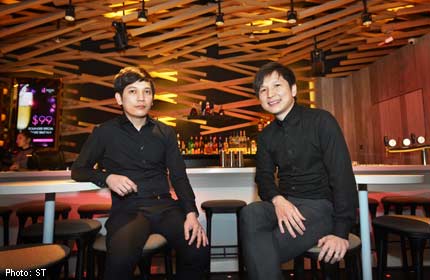
Home-grown Chinese restaurant chain The Paradise Group is muscling in on the food scene in the Chinese cuisine-centric markets of Hong Kong, Guangzhou and Shanghai with its signature xiao long bao.
The group will be opening its first Hong Kong outlet - Paradise Dynasty, a contemporary Chinese restaurant that offers xiao long bao in innovative flavours, from crab roe to foie gras, as well as northern and southern Chinese food - in the second quarter of next year. It will be a 10,000 sq ft space at Causeway Bay's Lee Theatre.
In the third quarter of next year, it opens in Guangzhou's Tianhe district, a bustling shopping and restaurant belt.
In Shanghai, the group at present has two Paradise Dynasty restaurants and will be opening a third outlet at the new APM mall in Huai Hai Road, Puxi, by the end of this year.
Headed by brothers Eldwin, 36, who is the chief executive, and Edlan Chua, 33, the chief operating officer, the group currently owns and operates 32 outlets in Singapore.
The annual turnover for the privately held company, which started out as a single zi char stall in Defu Lane in 2002, is now more than $100 million. The brothers say they expect that figure to jump to $150 million by the end of the next financial year.
Ask the brothers if they are worried about competition from other Chinese restaurants in China and Eldwin tells Life!: "We have our competitive edge. In fact, I'm not worried - we are confident."
That competitive edge, he adds, has plenty to do with what the restaurant offers in terms of taste.

He says: "In China, the xiao long bao is very different. The skin is thicker, the dumpling is bigger and also oilier. Ours, for example, is more delicate and has less oil. It is a new experience for diners there, and in terms of taste, what we offer is also very different."
In Shanghai, there are long queues at its Paradise Dynasty outlets for both lunch and dinner daily, he says.
Aside from China, the group's 15 overseas outlets - a combination of joint ventures and franchises as well as branches wholly owned and operated by the group - are located in countries such as Indonesia, Malaysia and Thailand.
Last month, it also opened a Paradise Dynasty in Tokyo, its first outlet in Japan.
Also on the cards are Kungfu Paradise, a Chinese cafe concept with Chinese food and Western items such as pasta, and Paradise Dynasty outlets in Manila in the Philippines and Melbourne, Australia.
By the end of next year, the group expects to open about eight to 10 restaurants overseas.
Eldwin says: "To be honest, I had no big plans or ambition to expand overseas. Our business grew organically. Suitors from overseas came to us."
In Singapore, it opened Le Restaurant, a new bar and restaurant that serves Asian tapas and modern Chinese cuisine, at Suntec City Mall last week. Another five to six more restaurants are expected to open by the end of the year.
These include a Canton Paradise at Bedok Mall, and Paradise Inn and Paradise Dynasty at Suntec City Mall. Other outlets in the pipeline include ones at Westgate in Jurong East and at One KM, a new mall in Katong.
The group will also be opening a new quick-service halal nasi lemak restaurant, My Nasi, which will be taking over the space currently occupied by Kungfu Paradise at Sembawang Shopping Centre.
It is also scouting for a suitable location for a Taiwanese beef noodle bar.
Branching out into quick-service restaurants is part of the group's diversification strategy to cope with Singapore's manpower shortages.
"We see potential in quick-service restaurants," says Eldwin. "In Singapore, (obtaining) manpower has become increasingly challenging. That is why there is a need for diversification.
"Compared to a full-fledged Chinese restaurant, quick-service restaurants need only a handful of staff."
Depending on the size, Paradise Group's Chinese restaurants usually need about 20 kitchen staff. Also, workers at quick-service restaurants, says Eldwin, need not be as skilled or experienced because the food will be prepared in the group's central kitchen.
He adds: "If the Government plans to restrict foreign labour further, there is no way we can open restaurants. We will probably need to close some."
In light of the scarcity of manpower, the group has also begun to restructure and consolidate its outlets and resources.
For instance, it plans to close about three outlets this year. The leases at three locations will be expiring in the last quarter of the year and the group does not plan to renew them.
But younger brother Edlan is quick to add that closing these outlets is not because the restaurants are not profitable. He says: "We are consolidating to make our manpower more efficient and will be concentrating on the more profitable outlets."
The brothers, who are married with young children, have two sisters who are not involved in the business.
Over the last two years, the group expanded locally with an average of 10 to 12 outlets a year, spending an average of $10 million a year. Its most expensive local venture this year has been Le, which cost $4 million to set up.
Aside from growing their Chinese restaurants, their dream is also to expand Le, a more Westernised Asian-food concept, to Europe and the United States, into cities such as London and New York.
Eldwin says: "Our dream is to make Paradise a global brand."

